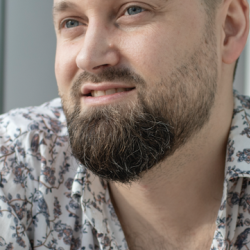Episode 6: Between Muslims: Religious Difference in Iraqi Kurdistan: a podcast with Dr Andrew Bush
In this third instalment of our mini-series on Living with Religious Difference, we talk to Dr Andrew Bush (Cracow University of Economics) about the way in which pious and not so pious Muslims in Iraqi Kurdistan craft everyday lives together. During our conversation, we delve into the everyday as a site of exploring religious difference and consider how poetry becomes a way of engaging with alterity, whether Christian, Muslim, or other.
About Andrew Bush
Andrew Bush completed a PhD in anthropology at Johns Hopkins University in 2014, and then held teaching and research positions at New York University Abu Dhabi until 2019. When the podcast was recorded, he was a Visiting Fellow in Harvard Law's School's Program on Law and Society in the Muslim World, and now as the podcast is released, he is a Research Fellow at the Cracow University of Economics.
His work has appeared in American Ethnologist, the Journal of Middle East Women's Studies, and the Wiley-Blackwell Companion to the Anthropology of the Middle East. His book, Between Muslims: Religious Difference in Iraqi Kurdistan, was published in 2020 with Stanford University Press.
Episode 6: References
- Atmaca, Metin (2021). "Negotiating Political Power in the Early Modern Middle East: Kurdish Emirates between the Ottoman Empire and Iranian Dynasties (Sixteenth to Nineteenth Centuries)." In Cambridge History of the Kurds, ed. Hamit Bozarslan, Cengiz Gunes, and Veli Yadirgi, Cambridge: Cambridge University Press.
- Benjamen, Alda ed. (2020). "Narratives of coexistence and pluralism in northern Iraq". Special Issue of the Journal of Contemporary Iraq & the Arab World, no. 14.
- Bush, Andrew (2020). Between Muslims: Religious Difference in Iraqi Kurdistan, Stanford: Stanford University Press.
- Ghaderi, Farangis, Clémence Scalbert Yücel, and Yasar Hassan Ali, (2021). Women's Voices from Kurdistan: A Selection of Kurdish Poetry, London: Transnational Press.
- Uşşaklı, Kerem Can (2002). "Securitizing Citizenship and Policing Security in Iraqi Kurdistan,’ MERIP 295.
Episode 5: Ruins, treasures, and memories of state violence in eastern Anatolia: a podcast with Dr Anoush Suni
For the second episode of our mini-series on Living with Religious Difference, Dr Marlene Schäfers talked to Dr Anoush Suni (Northwestern University) about her research on the reverberations of the historic Armenian presence in the lives of contemporary Kurdish communities in eastern Anatolia. Together they explore how the memory of the Armenian past lives on within Kurdish communities, how legacies of state violence materialize in ruins and treasures, and discuss how Armenian religious sites take on new meaning within Kurdish life worlds.
About Anoush Suni
Anoush Tamar Suni is currently the Keyman Modern Turkish Studies Postdoctoral Fellow at Northwestern University. Previously, she was a Manoogian Postdoctoral Research Fellow in the Armenian Studies Program and the Department of Anthropology at the University of Michigan. She earned her PhD in anthropology from the University of California, Los Angeles in 2019.
For her doctoral dissertation, entitled “Palimpsests of Violence: Ruination and the Politics of Memory in Anatolia,” she spent over two years (2015-2017) in the region of Van, in southeastern Turkey, conducting ethnographic research. She is currently working on her book project, which investigates questions of memory and the material legacies of state violence in the region of Van with a focus on the historic Armenian and contemporary Kurdish communities. Her research interests include state and intercommunal violence, memory, materiality and landscape, cultural heritage, space and place, and political and historical anthropology in Turkey, Armenia, Kurdistan, and the broader Middle East.
Episode 5: References
- Biner, Zerrin Özlem. 2020. States of Dispossession: Violence and Precarious Coexistence in Southeast Turkey. Philadelphia: University of Pennsylvania Press.
- Darici, Haydar. 2011. “Politics of Privacy: Forced Migration and the Spatial Struggle of the Kurdish Youth.” Journal of Balkan and Near Eastern Studies 13 (4): 457–74.
- Leupold, David. 2020. Embattled Dreamlands: The Politics of Contesting Armenian, Kurdish and Turkish Memory. New York: Routledge.
- Navaro, Yael. 2020. “The Aftermath of Mass Violence: A Negative Methodology.” Annual Review of Anthropology 49 (1): 161–73.
- Parla, Ayşe, and Ceren Özgül. 2016. “Property, Dispossession, and Citizenship in Turkey; or, The History of the Gezi Uprising Starts in the Surp Hagop Armenian Cemetery.” Public Culture 28 (3 80): 617–53.
- Tambar, Kabir. 2016. “Brotherhood in Dispossession: State Violence and the Ethics of Expectation in Turkey.” Cultural Anthropology 31 (1): 30–55.
- von Bieberstein, Alice. 2017. “Treasure/Fetish/Gift: Hunting for ‘Armenian Gold’ in Post-Genocide Turkish Kurdistan.” Subjectivity 10 (2): 170–89.
Episode 5: Music
Balık by Collectif Medz Bazar (with special thanks).
Episode 4: Religion as Moral Infrastructure in Rio de Janeiro: a podcast with Dr Tilmann Heil
In this opening episode of our new miniseries on Living with Religious Difference, the guest is Dr Tilmann Heil who talks about his research with Muslim Senegalese migrants in Rio de Janeiro, Brazil. We consider how religion may function as a moral infrastructure that allows navigating a world where different communities, beliefs, and convictions meet. Tilmann outlines how his interlocutors position themselves within their new lifeworlds and how religion becomes a key resource for negotiating, taming, and accommodating societal difference.
About Tilmann Heil
Tilmann Heil is a Postdoctoral Investigator at Maria Sybilla Merian Centre Conviviality-Inequality in Latin America - Mecila - and Principal Investigator at the Global South Studies Center at University of Cologne. In his current ethnographic research with West African and Southern European migrants in Rio de Janeiro, he inquires into how migrant newcomers value and evaluate difference within complex urban assemblages characterized by intersectional hierarchies and deep inequality. In his ethnography Comparing Conviviality. Living with Difference in Casamance and Catalonia (Palgrave, 2020) that derives from earlier work in Senegal and Spain, he has conceptualized conviviality as a process of interaction, negotiation, and translation from which forms of minimal and fragile sociality emerge. Across various spaces bordering the Atlantic, Tilmann has continuously addressed ethical reflections on, and habitual tactics of, everyday struggles with ethnic, religious, and racial plurality.
Episode 4: References
- Heil, Tilmann. 2019. “Muslim - Queer Encounters in Rio De Janeiro: Making Sense of Relative Positionalities.” Ethnography, no. online first: 1-20. doi:10.1177/1466138119859601.
- Diouf, Mamadou. 2000. “The Senegalese Murid Trade Diaspora and the Making of a Vernacular Cosmopolitanism.” Public Culture 12 (3): 679-702.
- Puar, Jasbir K. 2007. Terrorist Assemblages: Homonationalism in Queer Times. Next wave. Durham: Duke University Press.
- Haritaworn, Jin, Adi Kuntsman, and Silvia Posocco, eds. 2014. Queer Necropolitics. London: Routledge.
- Kane, Ousmane O. 2011. The Homeland Is the Arena. Religion, Transnationalism, and the Integration of Senegalese Immigrants in America. Oxford: Oxford University Press.
Episode 4: Music
Sneak by A.A. Alto; Kiss And Tell (breezy bossa nova) by Keshco.



